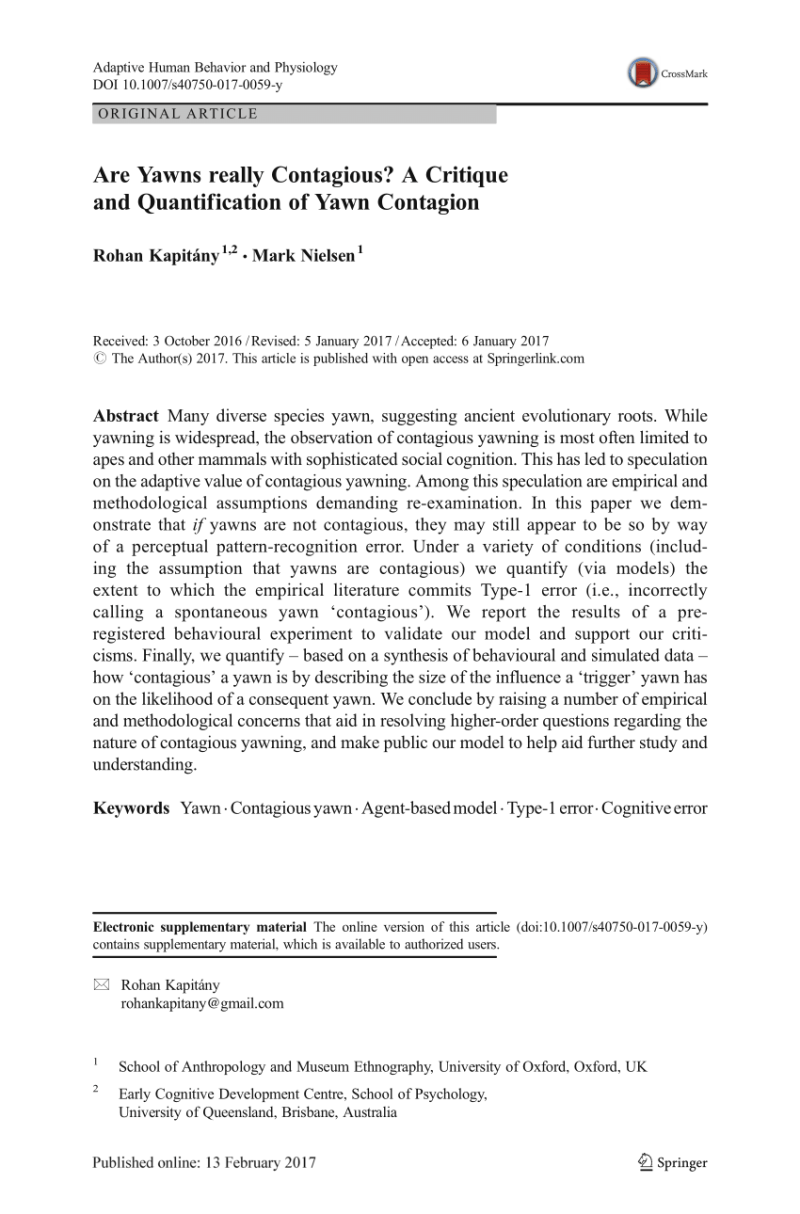What Makes A Yawn Contagious – Medically reviewed by Alana Biggers, MD – By John Johnson – Updated June 26, 2023
Yawning is an involuntary reflex that causes the mouth to open wide and the lungs to take in lots of air. Then the air is slowly exhaled.
What Makes A Yawn Contagious

No thought or action is required to produce a yawn, the process is the same for everyone. Yawning usually occurs before or after sleep, so it is usually considered a sign of fatigue. Yawning is also common in people who are doing boring or boring things.
Why Do We Yawn? The Secret Of Contagious Yawning
Yawning also has a social side. Yawning appears to be contagious among humans and other animals, and the epidemiology of yawning is well documented but poorly understood.
There is still no clear reason for the yawning. Many theories have been proposed and explored, and they provide some clues.
While yawning is often thought to be a result of fatigue or boredom, this may not always be the case.
Yawning is usually thought to be a symptom of sleeplessness or boredom, although this is not always the case.
Yawning Is Contagious, But Can You Prevent It?
A person who yawns may be tired, and the heart rate increases during a yawn. This increased heart rate suggests that yawning may be a sign of alertness rather than laziness.
In general, there may be only one way for the body to change its state of consciousness:
People may also yawn when they change physical positions, such as moving from a high-pressure area to a low-pressure area. This pressure builds up in the eardrum and may remind the person to release it.

Yawning may be a function of breathing. Yawning is more likely when the blood needs more oxygen. Yawning causes more air to be taken in and a faster heart rate, which theoretically means more oxygen is being pumped through the body. So yawning may simply be designed to clear toxins from the blood and provide fresh oxygen.
Why Yawning Is So Contagious And How It Could Help Treat Diseases
Yawning may cool the brain. Yawning causes the jaw to stretch and increases blood flow to the face and neck. The increased breathing and heart rate caused by yawning also cause blood and spinal fluid to circulate more rapidly in the body. This whole process may be a way to cool down an overheated brain.
Supported this theory. The researchers found that yawning occurs around 20°C, a temperature they suggest is suitable for cooling the blood and brain.
Some researchers believe that the cause of human yawning has something to do with evolution. Before humans communicated vocally, they probably used yawns to communicate.
Yawning is thought to be a sign of boredom or sleep, which is probably how early humans were communicating. However, early humans may have used yawns to signal alertness to others, bar their teeth at intruders, or serve as another communication tool.
The Science Behind Why Yawning Is Contagious
Humans and chimpanzees are not yawning animals. All vertebrates, from fish and birds to wolves and horses, yawn.
There are only three species capable of contagious yawning, however: humans, chimpanzees, and the wolf and dog families.
Although almost all animals can yawn, only a few species have been observed to exhibit contagious yawning. Canines such as dogs and wolves are among these species.

One thing most people agree on is that yawning seems to be contagious. Seeing another person yawn causes viewers to “catch” the yawn itself.
Yawns Are Cool · Frontiers For Young Minds
One group of chimpanzees was shown videos of other chimpanzees yawning. The results showed that chimpanzees were more likely to yawn when they saw chimpanzees familiar with yawning. This supports the idea that empathy and familiarity are involved in the transmission of yawning.
Found that infection in humans is an individual response. There was little correlation between intelligence, day, or empathy in the tests. The biggest factor they found was age. Older adults were less likely to yawn than others.
Yawning is usually harmless, but excessive yawning is possible. Excessive yawning can be caused by several different disorders that require treatment.
The pharyngeal nerve is the nerve that connects the pharynx and stomach to the brain and interacts with blood vessels to cause excessive yawning. This is called the vascular response. This reaction may be a symptom of a sleep disorder or brain disease. It may even be a sign of a heart condition, such as a heart attack or a problem with atherosclerosis.
Why Are Yawns Contagious?. Don’t Worry, You Won’t Be Yawning When…
Anyone who experiences a lot of yawning for no apparent reason should contact a medical professional as soon as possible.
Medical journalism today has rigorous source guidelines and relies on peer review, academic research institutions, and medical journals and societies. We only use quality, trusted sources to ensure the accuracy and completeness of our content. You can learn more about how we ensure our content is accurate and current by reading our editorial policy. It took scientists six months to train Alexandra the red-footed tortoise, but in mid-2009 she finally learned to yawn. A formal test was then conducted. Once a day, the research team placed Alexandra on one side of the small tank and the other turtle on either side of Moses, Aldous, Wilhelmina, Quinn, Esme, or Molly. Then when they saw the other turtles, they motioned him to tilt his head back and drop his jaw as he was taught. Will Moses drop his jaw? Will it be Aldos or Wilhelmina? Are there any signs that Alexandra’s tortoiseshell is infected?
It’s not there. The research team tried again, this time pretending that Alexandra had faked it not just once, but two or three times. Still, the watcher turtle didn’t respond. Next, the scientists had Moses and others watch a videotape of Alexandra, who had been practicing for months and not fake. Again, yawning was not contagious.

“Actual yawning may be necessary to stimulate an observer turtle,” the authors wrote in a 2011 paper.
Is Yawning ‘contagious?
. But “our findings are more consistent with the suggestion that turtles do not yawn in an infectious manner.”
This finding, or lack thereof, seems off-putting. But given what we know about the replication crisis in science, the turtle paper may be a sign of things to come. Could it be that the entire 30-year history of the small but vibrant field of epidemiologic yawning is resting on its toes?
In the 1980s, when contagious yawning was first studied in the laboratory, scientists predicted that the effect would be unique to humans. The yawn itself is not that unusual. Indeed, this behavior has been observed not only in mammals but also in birds, reptiles and amphibians. Rather, contagious yawning in response to others’ reactions seems to be a specific, social adaptation—an original form of empathy—not an indicator of higher consciousness. In 1989, psychologist Robert Provin, the father of epidemiologic yawning research, wrote, “Although the analysis of yawning is still in its infancy, its future is bright.”
Provine was the first to show in the 1980s that a person was more likely to yawn in response to a videotaped yawn than to a videotaped smile. But the field didn’t take off until 2003, when Steven Platek, a researcher at the State University of New York’s Gordon Gallup Laboratory at Albany, suggested that contagious yawning might be linked to a “theory of mind.” Another point of view. A series of papers after Platek’s publication showed that both children with autism and adults with psychopathic tendencies were less likely to be depressed than others. At the same time, another series of studies provided evidence that contagious yawning, and thus a form of social consciousness, exists in chimpanzees, domesticated dogs, parakeets, rats, and possibly wolves and monkeys.
News Release: What Contagious Yawning (or Lack Thereof) Says About Your Personality
It didn’t take long for Provine to prove that yawning was spreading. But epidemiologic yawning research has since grown and spread into the neighboring fields of neuroscience, etiology, and evolutionary psychology, and something that once seemed completely improbable—yawning in turtles—is now worthy of formal testing. Laboratory. It’s even worth announcing a scrap result, as if we’re surprised to see a turtle yawn
That’s what leads to the latest study on the epidemic of yawning, released last week. A new article titled “Is yawning really contagious? “Criticism and Quantification of Wild Infections,” lead author Rohan Capanini, a Ph.D. from the University of Oxford, says that research on the topic faces many methodological problems and that these problems are so important that they almost always result. Mischaracterizing spontaneous, naturally occurring yawns as “infectious.” “The idea that yawning is contagious may have arisen as a result of our tendency to see patterns and causes that don’t exist.
What causes a yawn to be contagious, what makes pink eye contagious, what makes yawning contagious, what makes a person yawn all the time, what makes people yawn, what makes shingles contagious, what makes you yawn so much, what makes me yawn, what makes us yawn, what makes you yawn, what makes a person yawn, why is a yawn contagious






